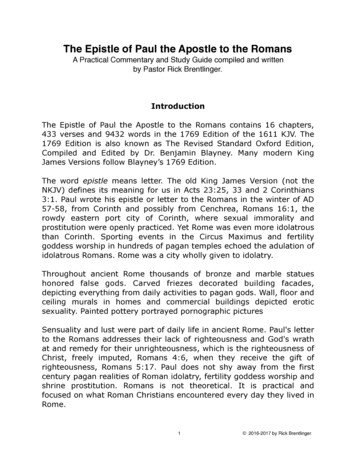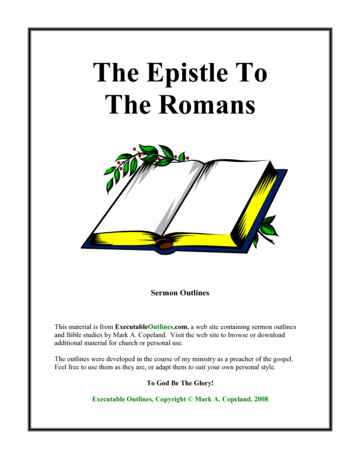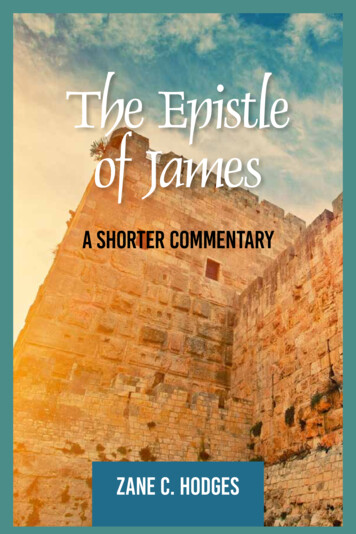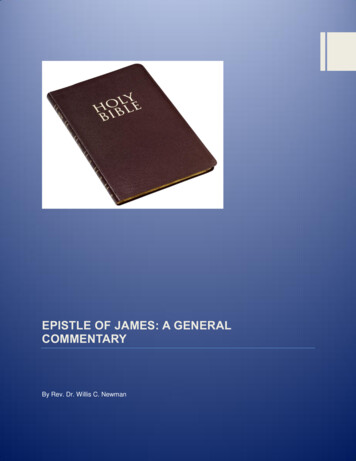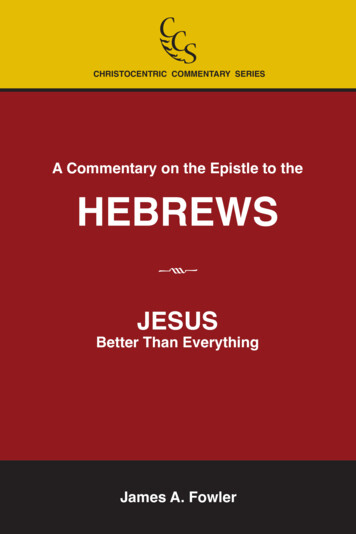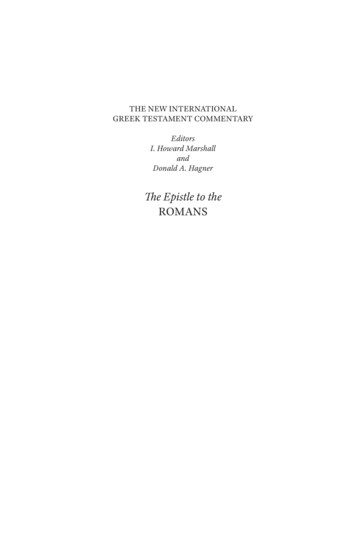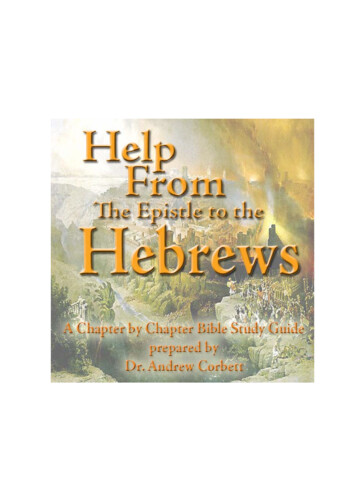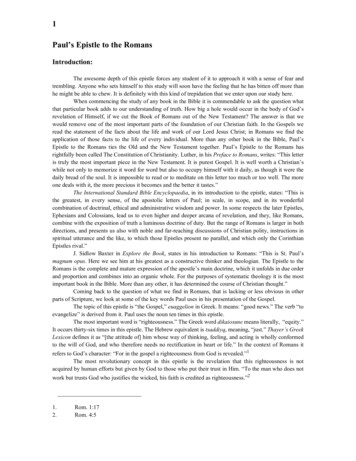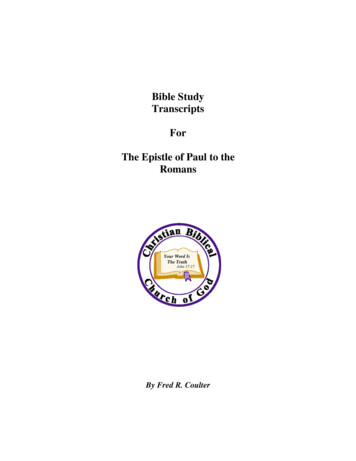
Transcription
Bible StudyTranscriptsForThe Epistle of Paul to theRomansBy Fred R. Coulter
1994, 1996, 1997, 1998, 2009, 2012Fred R. CoulterChristian Biblical Church of GodP.O. Box 1442Hollister, CA 95024-1442All rights reserved. Except for brief excerpts for review purposes, no part of this publicationmay be reproduced or used in any form or by any means without the written permission of thecopyright owner. This includes electronic and mechanical photocopying or recording, as well asthe use of information storage and retrieval systems.
Romans Series #1BackgroundThe Epistle of Romans IBackgroundFred R. Coulter—July 13, 1996With this sermon we are going to begin anextended series on the Epistle of the Apostle Paul tothe Romans. We will take whatever time it takes togo through and study it. Let’s take a survey and youwill see that there are four main parts to the studybooklets:1.2.3.4.Testament which they use to justify theirbelief that professing Christians are notrequired to keep the commandments andlaws of God. Once these basic teachingsare misinterpreted and misunderstood, thenmany other basic doctrines, which theApostle Paul wrote about in Romans, arealso stripped of their true meaning.IntroductionThe main body of the translationThe special word studies from the GreekThe Greek InterlinearSince some of the things, which Paul wrotein the Epistle to the Romans, are verydifficult to understand, it is essential toundertake special word studies of theGreek. As we study each importantdoctrine through these special wordstudies, we will learn that while some ofthe teachings he was inspired to write are“difficult to understand,” they are notimpossible to understand. In fact, we willlearn as we study these doctrines, with theaid of these special word studies that theyare not as difficult or as hard tounderstand, if each doctrine is carefullystudied in a systematic way.In the introduction the only thing I’m going tomention is that in the original, inspired order of theplacements of the books of the New Testament theyshould come as follows: Matthew, Mark, Luke John,Acts, James, 1st, 2nd Peter, 1st, 2nd, 3rd John, Jude, andthen Romans.Romans has some things which are verydifficult to understand, but we’ll try and make themunderstandable. We have five pages of theIntroduction and then we come to the body of thetranslation. If you turn there you’ll see we havebeginning with chapter one we have large type andwide margins so you can whatever notes you want tomake on it. I tried to make this translation asexacting as I possibly could, which will be a greatadvantage over the first series we did ten years ago,because I would have say the King James says this,but it really means this. This translation eliminatesall of that. Just read through the translation and Ithink you will find that it reads very well. There are29 pages for the text of the translation.Let’s just take a survey of the major topics.1. To Believe (pg 1)—that starts right out inthe first chapter.I took all the verses out of Romans and listed themby chapter where it talks about to believe. To believeis the verb form of faith.2. Faith (pg. 4)—With all of the Scripturespulled in full—‘en toutoo.’ What I did, Ipulled in all the definitions, as theyapplied, out of the Belief’s booklet, intoeach special word study. But, I didn’t putany of the Scriptural references other thanthose which are in Romans. Otherwise, wewould have such voluminous things herewe could never get on with it.Then you come to the Special Word Studiesfrom the Greek. I just want to cover a couple ofthings from the first two paragraphs:The Apostle Paul’s Epistle to the Romansis one of the most important books of theNew Testament.Without a doubt it is the most important.It contains the fundamental basis of trueChristian Scriptural salvation Notice how many [Scriptures] we had on faith andbelief.The wording of that is very deliberate! It has to betrue, it has to be Scriptural, it has to be Christian,and it has to be salvation.3. Grace of God (pg. 8)—again, I took thedefinition out of the Belief’s booklet andput it in there so that we have a fullunderstanding of it. through faith in Jesus Christ by grace.Most professing Christian religionsmisunderstand and misinterpret what Paulwrote concerning faith and grace vs lawand commandment-keeping. The Epistle tothe Romans is one of the books of the New4. Justification (pg. 11). What I’m going todo in my personal study, while we aregoing through this, I am going to translatekey sections of Galatians, because you1
Romans Series #1Backgroundcan’t go through Romans without goingback to Galatians.So, that gives us a survey of what we’re going tocover when we go through the book of Romans. It isundoubtedly the most important book that we have.a) To be Just (pg. 12)—that is one whois just.b) Justification (pg 13)c) Righteousness (pg 14)—I brought inout of the Beliefs booklet:righteousnessofthelaw,righteousness of faith and then thelast paragraph I have a detaileddefinition of righteousness.5. The Laws and Commandments ofGod (pg 19)—again I took all thedefinition out of the Beliefs booklet andput it there. Then I broke it down thisway:Let’s understand something else concerningthe Word of God. We know that the Apostle Paulwrote to Timothy, ‘All Scripture is given byinspiration of God.’ That becomes very importantwhen we’re studying in the book of Romans. Let’salso understand something from the Old Testamentrelating to the Word of God—let’s go to Psalm 138.I want you to remember the sermons concerning theimportance of anyone who is teaching the Word ofGod, to teach the things which God has commandedand not to be teaching something that God did notcommand.Psalm 138:1: “I will praise You with mywhole heart; before the gods I will sing praise toYou . [That doesn’t mean he’s going out before thepagan gods and singing praise unto God. It is in theface of any other god—which is not a god—he willsing praise to the true God! That’s what that phrasemeans.] I will worship toward Your holy temple,and praise Your name for Your loving kindness, andfor Your Truth ” (vs 1-2)—which we know Jesussaid, ‘Your Word is Truth.’ We can put all of thoseback together with Psa. 119:a) Commandment (pg 20)—the Greekword and definition for itb) The Law (pg 20)c) The Law with the Definite Article(pg 21d) Law used without the DefiniteArticle (pg 23)—a very importantsection. As we’re going to see, thatis going to be a key to understandingwhat Paul taught—very important!e) Work, Works, Works of Law and toWork (pg 25)—you go ahead andread the section there, but I’ll justmention this: Your commandments are true Your laws are true Your precepts are true Your judgments are true—and everything that has to do with Psa. 119.In the book of Romans a great error intranslation was done. I explain it here. The term inthe Greek: works of law—which then is ‘ergoonnomou’ means works (plural) of a law or any law.The King James translators added two definitearticles: the works of the law—and they didn’t makeit italics so we would know they added it. That’s notin the Greek. It makes a vast difference in ourunderstanding of what Paul wrote. When you say‘the works of the law’ what do you think of?Commandment-keeping! That’s where they get offand say you don’t have to keep the commandments.So, I’ll leave you in suspended animation with thatsince we’re just doing a survey!Now, the last part of v 2: “ for You havemagnified Your Word above all Your name.” TheWord of God is more important than the name ofGod, because the Word of God is what God hasspoken and God cannot lie! The name of God: Godwill change His name in relationship to the covenantHe enters in with the people.For example: Exodus 3:14: “And God said toMoses, ‘I AM THAT I AM.’ . [Which means I amwhat am and will be what I shall be!] And Hesaid, ‘Thus you shall say to the children of Israel, “IAM has sent me to you.”’” We could do a wholestudy, especially in the book of John, concerning ‘IAM.’I’ve taken these in importance as we meetthem as we come along:Exodus 6:2: “And God spoke to Moses, andsaid to him, ‘I am the LORD.’ [YHVH. I justlistened to a tape by some ‘Christian’ Jews wherethey pronounce it: YaHoVa—very interesting!] And I appeared to Abraham, to Isaac, and to Jacobas God Almighty [El Shaddai]. But I was not knownto them by My name JEHOVAH’” (vs 2-3). Thatwas not the covenant name that He used withAbraham, Isaac and Jacob. When we are born into6. Hope (pg 28)—that actually comes fromthe word faith.7. Love (pg 29)—I took the full definition oflove out of the Beliefs booklet; plus, Iadded quite a section, which was not in theBeliefs booklet, on pgs 30-31, explainingthe difference between ‘agape’ and‘philos’ and the verbs of them, too. I thinkyou’ll find it very interesting.2
Romans Series #1Backgroundthe Kingdom of God, we are going to be given ournew covenant name. That’s why He says, ‘I havemagnified My Word above My name.’In the first instance, to know the Word ofGod is to know of the Word of God and wherecertain things are. To know that you know the Wordof God is to understand it and be convicted in yourmind and to use the Word of God. I do believe thatGod is going to hold us all accountable, because wehave the greatest thing that there ever was: the wholeBible!Since we have our whole Bible here, let’s goto Luke 12. I think this becomes very important forus to realize and understand. I have alluded to thisseveral times, but now I will go directly to it andmention it, especially in relationship to what we willbe studying in the Epistle to the Romans.You go back again, and I admonish you, toread Psa. 119. It is says that God’s Word is ‘moreprecious than gold, yea, than fine gold!’ Years agopeople could say, ‘Lord, I weren’t educated, Icouldn’t read.’ He’ll be ‘beat with few stripes.’Guess what’s going to happen to us if we don’tapply ourselves who have an education and have theWord of God and do know? Centuries ago theycould say, ‘Lord, I didn’t even know that Your Wordexisted. All we had were parts of the book of John.Luke 12:40: “‘Now you, therefore, be ready;for the Son of man is coming in an hour that you donot think.’” Let’s understand that this can apply inseveral ways: to his literal return to the earth.We’re also going to see in the context here, that itcan apply: when Christ brings His judgment“Then Peter said to Him, ‘Lord, are Youspeaking this parable to us only, or also to all?’ Andthe Lord said, ‘Who then is the wise and faithfulsteward, whom the lord shall put in charge of hishousehold, to give to each one the portion of food inseason? Blessed is that servant whom the lord, whenhe comes, shall find so doing.’ . [That’s what weneed to be doing here, brethren.] Of a truth, I tellyou, he will set him over all his possessions. But ifthat servant shall say in his heart, “My lord delayshis coming,” and shall begin to beat the menservantsand maidservants, and to be gluttonous and becomedrunk, the lord of that servant will come in a day thathe does not expect, and in an hour that he does notknow, and will cut him asunder, and will appoint hisportion with the unbelievers’” (vs 41-46). Have weseen that happen? Have we seen the execution ofGod’s judgment upon those who reject the teachingsof God? Yes!Some could say, ‘Well, all we had was theOld Testament.’ But, brethren, we have all of theWord of God. So therefore, I think God wants us tounderstand it in its fullness and in great detail. AndHe wants us to apply ourselves to those things whichare hard and difficult to understand, because He willgive us understanding with His Spirit and His Wordif we apply ourselves to do it. That’s what we’regoing to do with this study through the book ofRomans. I think it’s going to be really tremendous!I’m very excited about it myself.Now, let’s give you a little bit of backgroundconcerning what is called The Letter to the Romans.First of all, I want you to look at the word ‘epistle.’In that is the Greek word for faith: ‘pistis.’ So wehave ‘pist’ which comes from the word root of faith.So this is a letter of faith to the Romans.I’m going to give you a little bit ofbackground from the Illustrated Dictionary of theBible. It’s talking about the letter to the Romans byPaul. I’ll just read certain sections from this and thena couple of other things.“And that servant who knew the will of hislord, but did not prepare, nor did according to hiswill, shall be beaten with many stripes; but the onewho did not know, and did things worthy of stripes,shall be beaten with few. For to whomever much hasbeen given, from him shall much be required; and towhom much has been committed, from him they willdemand the more.’” (vs 47-48).A letter written by the Apostle Paul to allGod’s beloved in Rome and now found asthe sixth book in the New Testamentcanon.As I mentioned, that is the wrong placement of it.We all have the Scriptures of God in ourhand—do we not? Yes! We also have available somany research things that have not been available inpast generations. Do you not think that God is goingto hold us responsible for understanding His Word?Yes! That’s why it’s very important that in thesetimes of stress that we’re going through—upheavaland turmoil within the Church—that we know thatwe know the Word of God. Not just a matter that weknow it, but we know that we know! There’s adifference between the two.It is the longest of all of Paul’s letters andoffers the most comprehensive account ofHis understanding of the Gospel of Christas the effectual Divine remedy for theplight of man, the universal sinfulness andguilt which no human effort can remove.A key thing: No human effort can change yournature! That’s a key thing concerning all the bookof Romans.3
Romans Series #1BackgroundThough it contains some of the elements ofa true letter—a personal communicationprepared for a particular group of readersrather than a literary constructionemploying the form of the letter—itapproaches more nearly any other of theapostles writings to be a formal theologicaltreatises.Absolutely is!Then it says, v 11: “Cretes and Arabians ”If you just picture this in your mind, that is coveringa huge geographical area. If you also remember thateverything that happened in the life of Jesus was notdone in a corner and it was well known, and thatmost of these people had already probably heardabout the events surrounding the crucifixion; hadalready heard about the events surrounding thosedead saints who were resurrected and came back intothe city. Yea, maybe even talk to some of them andsaid, ‘Were you really dead?’ Yes, and let me tellyou what it was like when I woke up in the grave.Then someone said, ‘Yeah, let me tell you what itwas like when they came and knocked on the doorand I opened it and there they were!’ These wereamazing times that were going on. This is the start ofthe Church at Rome.Certainly, it must be said that theexposition of theology is not developed inthe immediate relationship to the particularproblems or errors of the Roman Church.What they’re saying here: Paul does not enumeratein this letter particular problems of the Church atRome like he does in 1st and 2nd Corinthians.We are not told how many of these people atRome who were baptized, but there were 3,000 whowere, and many of them stayed well beyond so theycould be with the apostles and learn and so forth. So,we do have an inkling of when the Church at Romebegan.They say nothing is known of the foundingof the Roman Church.That’s partially a true statement, partially not a truestatement. Let’s see what we know about thefounding of the Church. Today, we may not knowcertain facts because they weren’t written down andrecorded for us—that is true. So we have to takeeverything at face value the way it is, but we canferret out certain things if we would.Now, back to the Illustrated Dictionary ofthe Bible:The Church at Rome was composedmainly of Gentiles.On the day of Pentecost, Acts 2:7: “And theywere all amazed, and marveled, saying to oneanother, ‘Behold, are not all these who are speakingGalileans? Then how is it that we hear each one inour own language in which we were born?’ .[Now, let me give you a geographical location ofthese that are mentioned]: Parthians and Medesand Elamites, and those who inhabit Mesopotamia [that is all of the area east of Palestine, includingJordan, Syria, Iraq, Iran, TransJordan, all the wayover to the Indus River where Elam was—way east.] and Judea and Cappadocia, Pontus and Asia [All of those are in Asia Minor; so just think of thewhole country of Turkey—Jews from every area ofthere.] both Phrygia and Pamphylia, Egypt and theparts of Libya which are near Cyrene [Egypt,Libya, Cyrene, which may be close to Cyprus. Weknow that when Paul started his ministry after hisordination, he went to the island of Cyrus.] andthe Romans who are sojourning here [strangers] [these may have been proselyting Gentiles.] (We allknow it says): both Jews and proselytes’” (vs 710).I’m sure that at first it was composed mainly ofJews, then later Gentiles.Then you had a problem when Claudiusforbad all the Jews to be in Rome—hechased them out. That’s when Priscilla andAquilla left and that they were able toteach Apollos at that time. Then the Jewswould come back, then that createdanother problem. It was a Greek-speakingsociety. The letter was basically written topave the way for Paul to come on his visit.The best we have we have to where he waswhen he wrote it is the city of Corinth,because he sent Phoebe, one of thedeaconesses, to hand-carry the epistle tothe Church at Rome. Now, there isevidence that the Church at Romeconsisted of many, many housechurches Sound familiar? and that this epistle was passed aroundto all of those house churches.There were Jews from Rome, strangers fromRome—and I’m sure some of the strangers fromRome included some of the Roman guards who werethere, some of the Roman officials who were there.They were the occupying power that was in the areaof Judea.That’s why when you read in Romans 16, you haveall of these greetings, and then he says, ‘ unto theChurch in the household’ and so forth. It was writtenbetween 54-57A.D.4
Romans Series #1BackgroundNow, I want to read to you from The WordCommentary concerning a little bit about theintroduction to Romans. You have to weed throughso much to get a few little good things out of them,because basically these people who write thecommentaries are not believers. Most of them areagnostics; many of them are atheists and could careless. That’s why the theology of Christianity in theworld is so bad today, because the teachers at theseminaries are debunking and knocking down theWord of God. He brings out that Paul was a Jew.We’ll talk about that a little bit later and get intosome of the Scriptures. I think they make a mistakehere by saying:Now then, let’s illustrate some of theproblems that the Jews had with Gentiles. They givea quote here out of the Book of Jubilees (chapter22:16)—and lo and behold I’ve got a Book ofJubilees at home and I look to see if it was correctand it is correct: Book of Jubilees (chapter 22:16):Here is the attitude that the Jews hadtoward the Gentiles: “Separate yourselvesfrom the Gentiles .I want you to think about how Peter got snagged inthis a little later in Gal. 2. Do not eat with them. Do not performdeeds like theirs. Do not becomeassociates of theirs. Remember, their deedsare defiled. All their ways arecontaminatedanddespicableandabominable.”The all consuming nature of hisevangelistic drive is sufficiently clear fromsuch passages and he reiterates them. and must have been a determinativefactor in framing and shaping this letter.The point may be thus: From his ownperspective, Paul was first an evangelistand missionary, and only secondarily atheologian.So, here’s the solution:Foristious writes: “In his wisdom, thelegislatorI think that’s referring to Moses, but please let’sunderstand one thing: When the Jews speak ofMoses, that includes everything that they have donedown through the centuries to add to it. Theyconsidered what they did was equivalent to and, yes,in many cases, greater than what Moses did. Theygot carried away to such an extreme that they saidthat if a rabbi would make a decision counter to thelaws in the Scripture, that God Himself was boundto uphold that decision because of the importance ofthe rabbis.I think that is an incorrect statement. They aremaking comparisons with their knowledge oftheology today, in how they do it, in relationship towhat Paul did or didn’t do. You can’t make any ofthose comparisons at all because he was an apostleof God.Also, something that was very important. Ithink that Paul also understood that sooner or laterthere were going to be vast problems in Jerusalem.He did not write this letter to the Jews which are inJerusalem. He wrote this letter to the Romans.Comment: That sounds like the Catholics.Yes, indeed! We will find in another study thatCatholicism came out of Alexandrian Judaism—without a doubt!Then it talks considerably about the Gentileswho were there. One thing we will see is that Paulbrought all human beings to the same level—didn’tmatter whether you were Jew or Gentile, free orbond, rich or poor—you are all sinners by nature.The book of Romans tells us how God isovercoming that particular problem. It also talksabout how that the churches may have begun in thesynagogues—which is true—and that there were alot of what they call God-fearing Gentiles who werefollowing all the precepts of Judaism, savecircumcision. Then they conclude by saying:Separate yourselves. Do not eat with themand so forth.So, here’s his letter:In his wisdom the legislator surrounded uswith unbroken palisades and iron walls toprevent our mixing with any of the otherpeoples in any matter. So, to prevent our beingperverted by contact with others, or by mixingwith bad influences, he hedged us about on allsides with strict observances connected withmeat and drink and touch and hearing andsight after the manner of the law.The Epistle of Romans contains fourdistinct areas: Jews unconverted, Jewsconverted, Gentiles unconverted, Gentilesconverted.That is heart and core and part of the problem inRomans and especially in Galatians. They also hadanother problem, which was this: They had a senseof distinctiveness, that they, because of theirphysical inheritance and their religion andWe’ll cover those basically in the first three chaptersas we get to it.5
Romans Series #1Backgroundcircumcision that they were privileged above anyother people.This is why they considered themselves ‘theprivileged elect.’ To this day it comes down.Whenever you talk with someone who is a Jew, healways lets you know, ‘I am a Jew.’ Paul said itdoesn’t make any difference. Coming from Paul thatis just like sticking a knife under the fifth rib. Whatthey did, they separated themselves with thedistinction of circumcision, food laws and theSabbath.Go to Romans 2:25 and let’s read somethinghere: “For on the one hand, circumcision profits ifyou are observing the law [notice, I added thebecause it’s not in the Greek.] on the other hand,if you are a transgressor of law, your circumcisionhas become uncircumcision!” An unthinkablestatement! You need to understand this! This ispowerful! This is unthinkable! because thesepeople—the Jews, converted and unconverted—figured they had special privilege over everybody.This is tough stuff here!Now, let’s go the Scriptures. I want to bringto your attention a book The Harmony of the Life ofSt. Paul—not as the Catholics view it—by Frank J.Goodwin (logos.com). He lays out parallel accountsabout Paul’s life. I’m going to cover the Scripturesthat are laid out here.Verse 26: “Therefore, if the uncircumcisionis keeping the requirements of the law, shall not hisuncircumcision be reckoned for circumcision? Andshall not the uncircumcision by nature, who arefulfilling the law, judge you who, with the letter andcircumcision, are a transgressor of the law?” (vs 2627). You talk about fighting words of the highestnature! Now you know why the Jews were out to killPaul at every turn. And we’ll see later some morereasons. The Jews figured because they were Jewishby genetics, Judaism by religion, that they hadspecial gifts and special favors of the covenant andthe law. That’s when we come to Rom. 7 and we’llsee why Christ had to die.Let’s begin with the early training of Saul.Remember, his name originally was Saul. Was therenot another man who was called Saul, who was thefirst king? Was he not a failure because ofdisobedience and his lying cursed all the waythrough? Yes! Now we have Saul, and we’re goingto find out that God deals only in the impossible!What do I mean by that?When Satan got Adam and Eve to sin, I betthat Satan thought ‘it’s impossible for God to workHis plan.’ But He had a way! Then we got Cain todo what he did, and ‘oh no, it’ll never go, I’ve reallygot it.’ But God raised up a replacement. Then wegot the whole world to sin and God had to destroy itwith the Flood, and Satan said, ‘Now I’ve got them,God has got to destroy all of them.’ But there wasNoah. So God did the impossible and saved thehuman race through Noah. Then it came the Towerof Babel right after and it was ‘Boy, now I’ve gotthem all together’ and God did the impossible andconfused their languages and scattered them abroad.Then God also did something else which wasimpossible: He called Abraham at age 75!Here is part of the curse that they broughtupon the Gentiles. This is taken from the Psalm ofSolomon. I did not have that book to find outwhether it is true or not. The Psalm of Solomon isnot in the Scriptures. This is an apocrypha writing.And it’s very doubtful that Solomon wrote this, buthere is the quote just show the attitude:The destruction of the sinner is terrible, butnothing shall harm the righteous.That is ‘we Jews who are circumcised are righteous.All Gentiles uncircumcised are sinners by nature.Look at the conflict that this creates.(go to the next track)At the impossible age of 100—and Sarahwas 90—Isaac was born! Then Rebecca could notconceive, so impossible she did conceive and borntwo sons; the same way with Rachel and Jacob, thatshe could not conceive and final did. Then we cometo the greatest impossibility of all: God became ahuman being! God walked the earth manifested inthe flesh! God in the flesh—not a hundred percentflesh—could not have been, but you understandwhat I’m saying—DIED! Another impossiblething!—and was resurrected back to life! Anotherimpossible thing! Then God calls us—that’sanother impossible thing!—to fulfill what Paulwrote. He calls those that are nothing to bringabout the destruction of those that think they areeverything! It’s exemplified in Paul’s life.Nothing shall harm the righteous of allthese things, for the discipline of therighteous for the things done in ignoranceis not the same as the destruction of thesinners.I want you think about why God had to destroyJerusalem, destroy the temple, scrape it off the faceof the earth! Because of these attitudes right here.The Lord has spared His devout, He willwipe away their mistakes with discipline.Their own works!For the life of the righteous goes onforever, but sinners shall be taken away todestruction.6
Romans Series #1BackgroundPaul was not liked by hardly anybody,except those who knew him personally greatly lovedhim. Everybody else hated him. So, let’s pick up onhis early training. Let’s come to Acts 21:39. I’m notgoing to give the flow or the context of these, I’mjust going to pick out the verses, and he’s laid it outhere in a very good harmony. By the way there’salso a Harmony of Samuel, Kings and Chronicles,that’s quite good, too.the Greek speaking. Otherwise Paul did his owntranslating.Let’s think about this for a minute. If he didhis own translating and was a Hebrew of Hebrewsand knew the Hebrew language concerning sacrednames, if it were important, he would have gone intoit in detail. Furthermore, knowing both Hebrew andGreek, would he have not inserted the Hebrewnames of God? Yes! So therefore, God inspired himto write it wholly in Greek the way we have it today.That’s important! So, if you get any sacred-namerscoming after you, you’ve got them! Gottcha!Acts 21:39: “But Paul said, ‘I am a man whois indeed a Jew [When he says ‘I am a Jew’ he isnot saying that he is from the tribe of Judah. He issaying he is a practicer of Judaism. It’s important tounderstand.] a citizen of Cilicia from Tarsus,which is no insignificant city .” Then there aresome other places there. I will just give you thesereferences: Acts 22:3; 23:34. In both of these he saysthat he was ‘of Tarsus’; so that’s where he was born.Then he says, “ with respect to law, aPharisee” (v 4). Boy oh boy oh boy!Now, let’s look a little bit at his education.Let’s come to Acts 22:3. Let’s understandsomething: Paul—called Saul before he was calledPaul—was well known! He was a gifted man ofaccomplishments. Acts 22:3: “I am a man who isindeed a Jew, born in Tarsus of Cilicia, but broughtup in this city [he was talking to the Sanhedrin inJerusalem; brought up in Jerusalem] at the feet ofGamaliel [the leading teacher of the law andJudaism at the time] having been instructedaccording to the exactness of the law of our fathers,being a zealot for God, even as you all are this day.”Now, he shows in Rom. 10 that their was misplaced.They had a zeal, but not the true knowledge.Now, let’s come to 2-Corinthians 11:22.This is interesting, speaking of the false apostles,Paul says: “Are they Hebrews? So am I. Are theyIsraelites? So am I. Are they the seed of Abraham?So am I.” We’ll see a little later when we get intochapters 9-11, that not all the seed of Abraham arethe ‘children of the promise.’ What are some of the‘seed of Abraham’ that are not the ‘children ofpromise?’ Ishmael, the six sons by Katura, Esau(from Isaac). Then we have of the 12 sons that werechosen, there were those who were chose fromwithin: Ephraim a
extended series on the Epistle of the Apostle Paul to the Romans. We will take whatever time it takes to go through and study it. Let’s take a survey and you will see that there are four main parts to the study booklets: 1. Introduction 2. The main body of the translation 3. The spe
